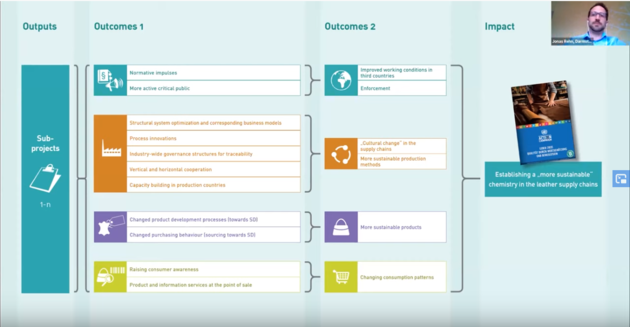Transformation in the leather supply chains
Artikel vom 30.06.2020

On the 29th of June, a workshop was held to discuss concrete projects regarding a transformation toward more sustainable practices in the leather supply chain with stakeholders.
Beginn: 30.06.2020 | 07:30 Uhr
Ende: 30.06.2020 | 07:30 Uhr
Ort:
Schader Forum
|
Goethestraße 2
|
64285 Darmstadt
|
In Google Maps öffnen
Transformation in the leather supply chains
The leather industry is facing new and complex challenges, especially in the realm of sustainability. When it comes to achieving a “more sustainable chemistry” in the leather supply chains, the industry faces numerous obstacles. For brands e.g., it can be hard to achieve control of processes (leather production and processing, other business processes), to ensure compliance with a changing legal landscape and enforce more sustainability- focused practices among their suppliers along complex supply chains.In order to overcome these issues, we must go beyond technical innovations. Apart from the optimization of production processes, there is a need to address the issue of supply chain management, as well as to create incentive structures within a global context
The project “system innovation for sustainable development (s:ne)” has set itself the goal of tackling these questions and challenges. Since 2018, the project is working in close collaboration with local and global players of the leather supply chain to develop systemic approaches for more sustainable leather supply chains in the foreseeable future: How do we want the supply chain to look like and which strategies should be developed in order to reach these goals? For more information on these prior project steps, you can find more information here.
Through discussions with the thus far involved stakeholders, concrete starting points emerged. Apart from the demand for harmonized and formalized production standards, there seems to be a need for innovative forms of collaboration within the industry.
With the aim of achieving a “more sustainable chemistry” in the leather supply chains, the stakeholders identified four key working areas:
1) Harmonization of standards,
2) IT Tools and Governance for Traceability,
3) Innovation in chemicals and processes and
4) leather design guidelines.
On the 26th and 29th of June, researchers from the s:ne project presented their ideas for subprojects in these key working areas. More information as well as a recording of the conferences are accessible here.
We are always interested in gaining new perspectives and get to know further actors in the field. Interested companies as well as other stakeholders are, thus, invited to take part and to play an active role in one or more of our four subprojects. You can contact the project leader, Dr. Julian Schenten, here.
Aktuelle Veranstaltungen


